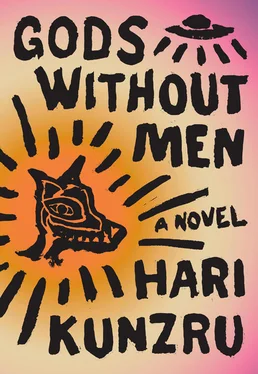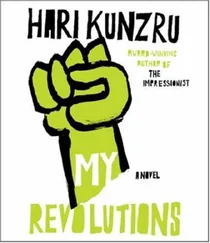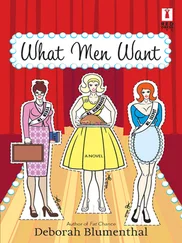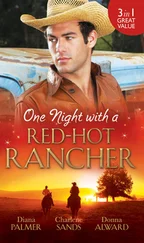Jaz said he wanted to go home to New York. They could fly out to California if there were developments. If, she asked. What did he mean, “if”? He was angry. Why did she insist on twisting everything? Did she think she was the only one who cared? She told him she was going to stay. He said it wasn’t a good idea. Who’d look after her? Her mom and dad were back in Phoenix. If she wanted to be closer, why didn’t she stay with them? He seemed to want to get rid of her. It was as if they were on twin moving walkways, separated by a partition. Moving along side by side, unable to touch.
Well actually Sally we don’t speak to each other much. Though I’ve never told him, he’s not stupid. He knows something happened. Often I think — I have all the time in the world to think, since, as I believe I told your viewers, I suffer from insomnia and even with the cocktail of drugs I take every day I often find myself alone in the dark with hours of solitude to kill, and I kill them by thinking about my broken relationship with my husband — yes, I think he knows the shape of what I did, and because he knows I suspect that even if our son is given back to us, that miracle probably won’t be enough to hold us together .
The lights were making her sweat. She could feel her dress clinging to her back, a pool collecting between her breasts. Price said the interview was to “press reset on her public image.” She wondered if the public still cared. The Matharus were an old story now. They wouldn’t be renewed for another season. Her face itched under the makeup and she wondered if she was going red. Her body rebelled against her a lot these days. Hot flushes, rashes, breakouts. At quiet moments, she could feel herself trembling. Her hands were folded in her lap and they were quivering now, as if they had an independent life, as if they were birds about to take off into the hot studio air and fly away. Jaz was saying words, sticking to the talking points. How was he able to do that? She imagined her hands, panicking birds, beating themselves against the lighting rig, searching for an exit.
She did sleep sometimes, stretched out on her back like a corpse wearing a mask and earplugs, fathoms deep under a sea of sleeping pills. Sometimes she had confused dreams about the rocks, and about a dog-headed man, neither threatening nor friendly, who was holding Raj’s hand. She would be playing with Raj in the dust, the three spires outlined in the darkness, because it was always night in these dreams. She’d be trying to make him use the potty, doing all the things the books said you had to do — showing strong encouragement, praising, never punishing — and she would turn to the dog-headed man and say this is a very stressful time
this is a very stressful time
and the dog-headed man would scoop up Raj and for a moment he would stand there, looking at her with his unknowable black eyes and then he would turn and run away.
Q. New York is sympathetic to you, but elsewhere people have been less understanding. How do you feel about the image of you as rich city slickers who got into trouble?
She was walking away across the parking lot, her rubber sandals flicking against her heels, and she could feel semen slick on her thighs and she realized she was drunk, really drunk. Suddenly, she was dazzled by headlights, raking her like gunfire as a car swept past, then reversed, the window winding down.
“You OK, honey?”
It took her a moment to recognize the driver as the woman from the motel. She looked behind her and saw the men from the bar, hands in pockets, fanned out in a ragged line. Waiting.
The woman leaned over and pushed open the passenger door.
“You better get in. You ain’t got a bag or nothing? Nothing at all?”
Then there was the road, rising up in the headlights, the smell of perfume and cigarettes, the radio playing mournful country music, fading in and out of static. They didn’t talk much.
“Call me Dawn,” said the woman. “That’s not such a good place for you to go drinking.”
She asked where they were going.
“Not far. To see a friend of mine. After that I’ll take you home.”
“I don’t want to go home.”
They turned off the main road onto a track and stopped outside a house shaped like a dome. A fairy-tale house. The front door wasn’t locked. She remembered that distinctly. The unlocked door. Dawn called out as they stepped over the threshold and the woman came down and together they held her under her arms and lifted her up because her legs wouldn’t move and inside it smelled of woodsmoke and there were baskets and clay jars and Indian rugs. It felt good to lie down.
They put a blanket over her.
Q. We’re seeing a new side of you. A very emotional side. Is this the real Lisa Matharu?
…
Q. What do you think of the theory that a wild animal, possibly a coyote, could have taken your child?
The raid, when it came, was sudden and brutal. They arrived at four-thirty in the morning, a convoy of trucks and Crown Victorias bumping up the dirt road in the predawn. Two girls were awake, coming off a trip, sitting up on the rocks and waiting for the sunrise. Afterward they told how they’d seen it go down, the dull gleam of rifles and shotguns, the men rousting people out of the dome, lining them up on their knees in the dust.
Amerika.
Dawn was inside, snuggled next to the older of the Sky Down Feather Brothers. The cops burst in, kicking and clubbing people, no warning, no time to react or do anything at all except try to keep hold of a blanket to cover yourself as they pushed you out the door. They were dragging guys by their hair, shining powerful cop flashlights on naked girls, grabbing tits and ass as they took them out for the lineup. Sheriff Waghorn stood up on the kitchen table, which creaked under his bulk as he yelled orders into a bullhorn. You could hear crashes as the pigs searched, the shatter of glass. They were making sure nothing stayed in one piece.
They were searching for drugs and weapons. They found them. Knives from the kitchen, a hunting rifle, pills and grass. There was other stuff too, but that was all safely buried out in the desert.
They arrested thirty people. Six went to jail. Turned out the town had gotten themselves Donny Hansen, all six-foot corn-fed octopus-handed QB1 of him, as their star witness. Donny was one of the beer drinkers, the catcallers, big butch high-school heroes who felt like shut-out little boys when they looked over the fence at all the lights and singing and pretty girls on the other side. His dad owned the gas station, the hardware store and a few hundred acres of range to the south of town. He’d hated Dawn ever since he tried to get his thing into her mouth at the drive-in and she fought him off and went to sit in Robbie Molina’s truck.
One night Dawn had found Donny inside the dome, dressed in some kind of “undercover” fringed buckskin jacket, picking his way between groups of people, trying to score. He was patting shoulders, offering handshakes. Hey man. Got any stuff? No one was biting; he sounded like an actor in a public-education film. She ran to find Wolf and Floyd, who agreed he was behaving like a narc and threw him out. Donny swore he was on a dare from some of the other football guys. They didn’t believe him, but what could they do? When nothing happened for a week or so, they told themselves they’d dodged a bullet.
Turned out he’d been sent by the Rotary. She could picture the scene. The boys in the back room of Mulligan’s, working on a bottle of Four Roses and a big bowl of chips, throwing out names of who to send on their dirty little mission. Donny looked up to all those guys, those Rotarian guys. He cared about their good opinion. He’d eventually go and get himself killed for it over in Vietnam, but that was a couple of years later.
Читать дальше












